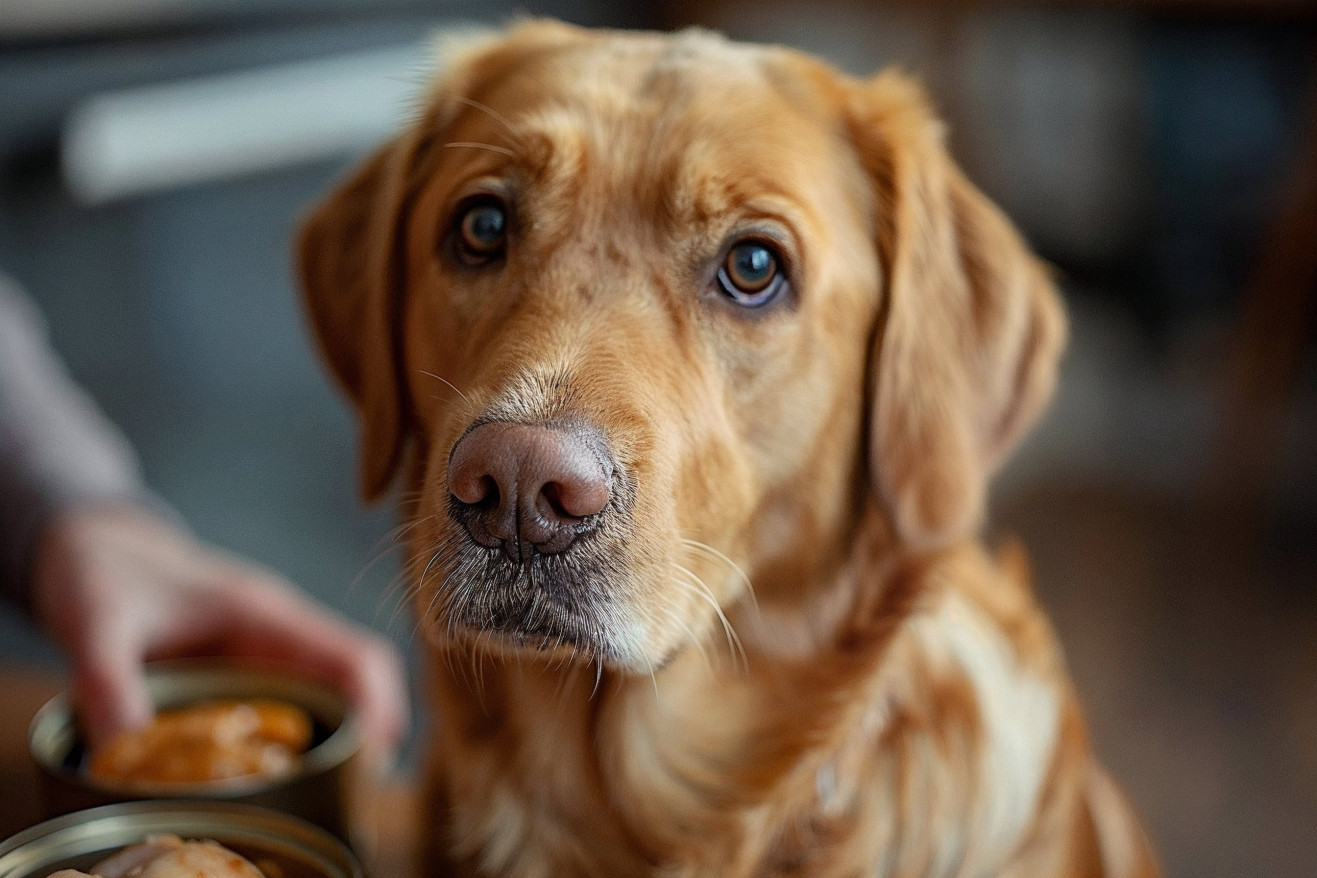Can Dogs Eat Canned Chicken? Potential Pros and Cons
19 March 2024 • Updated 19 March 2024

If you have canned chicken in your pantry, you may be wondering if it’s safe to share it with your dog. The answer is yes, but there are some important things to keep in mind. Canned chicken can be a good source of lean protein and essential minerals for dogs, but there are also some potential downsides. Canned chicken is safe for dogs to eat in moderation, but it should be fed with caution.
Canned chicken is safe for dogs to eat in moderation, but it should be fed with caution. While it can be a good source of lean protein and essential minerals, canned chicken should be fed in small amounts and only if it’s free of added salts, seasonings, and preservatives. Low-sodium options are best, and you should be careful not to feed your dog too much at once to avoid digestive upset.
We’ve looked at the latest research from veterinary nutritionists and other pet experts to help you better understand the potential pros and cons of feeding canned chicken to your dog. By the end of this article, you’ll know how to feed canned chicken to your dog in a way that supports their health and well-being. With a little bit of care, canned chicken can be a safe and enjoyable addition to your dog’s diet.
Can dogs eat canned chicken?
Benefits of Canned Chicken for Dogs
There are a few potential benefits to feeding your dog canned chicken. For one, it's a lean source of protein that provides the essential amino acids necessary for muscle growth and maintenance, according to the American Kennel Club. It also contains minerals like iron, zinc, and selenium that are important for oxygen transport, immune function, and thyroid function, says PetMD.
For dog owners, canned chicken is a convenient and affordable way to add protein to their dog's diet. It can also be a good option for dogs with food sensitivities, especially since chicken is less likely to cause an allergic reaction than beef or lamb, according to Camp Canine Florida. Canned chicken can also be easier for dogs to digest, especially if they're recovering from an illness or have a sensitive stomach.
That said, it's important to note that canned chicken should only be given to dogs in moderation and as a supplement to their regular diet. While it can be a healthy addition to a dog's diet when fed in the right quantities and as part of a balanced diet, there are also some potential drawbacks.
Potential Risks and Concerns of Feeding Dogs Canned Chicken
While canned chicken can be a good source of essential nutrients, there are also several potential risks and concerns to consider. According to Heart + Paw, canned chicken is often high in sodium, which can be dangerous for dogs if they have too much. Some dogs are also allergic to chicken, which is one of the most common allergens in dogs.
In addition, canned chicken may contain preservatives or other additives that are not good for long-term consumption, according to Fetch Pet. The bones in canned chicken can also be a choking hazard or cause internal injuries if swallowed, according to the Whole Dog Journal and AKC Pet Insurance.
Feeding your dog too much canned chicken can lead to an unbalanced diet, which can result in nutritional deficiencies or obesity. Make sure to watch portion sizes and make sure that canned chicken is only given to your dog as an occasional treat, not as a staple in their diet.
How to Safely Prepare and Serve Canned Chicken
If you want to feed your dog canned chicken, there are some things to keep in mind to make sure you do it safely. First, rinse the canned chicken thoroughly under running water to remove as much sodium as possible, as Patio Pet Life notes. Do not add any seasonings, sauces, or anything else to the canned chicken that could be harmful to your dog.
It's also important to remember that canned chicken should be used as an occasional treat or topper and not as a main source of protein for your dog, as My Dear Whippet explains. Be sure to watch portion sizes based on your dog's size and how many calories they need to consume in a day to make sure you're not overfeeding them. According to Patio Pet Life, canned chicken should make up no more than 10% of your dog's daily calorie intake.
If you want to make a more complete meal for your dog, you can mix the canned chicken with other dog-safe ingredients, such as rice or vegetables, as the We Are Not Martha recipe suggests. This will help make sure your dog is getting a good variety of nutrients while still enjoying the taste of the canned chicken.
By following these simple preparation and serving tips, you can make sure you're feeding your dog canned chicken in a safe way. However, it's always important to pay attention to your dog's individual needs and reactions, as some dogs may have sensitivities or health issues that require a more specific diet.
Can Puppies and Senior Dogs Have Canned Chicken?
Puppies and senior dogs have different dietary needs than other dogs, and therefore, the question of whether or not they can have canned chicken is a bit more complicated. Puppies need to have a diet that is rich in complete and balanced nutrition to help them grow and develop properly, according to PetMD. As a result, canned chicken can be given to puppies but only in small amounts and after being introduced to it slowly to make sure it doesn't cause any stomach upset.
On the other hand, senior dogs may have dietary restrictions and sensitivities that make it difficult for them to eat canned chicken. Before giving your senior dog canned chicken, it's important to talk to your vet to make sure it's safe, according to Successful Pets.
In both cases, it's important to make sure that your dog isn't having any digestive issues or allergic reactions after eating canned chicken. If your puppy or senior dog has a sensitive stomach, it may be better to give them boiled, unseasoned chicken, which is easier to digest, according to PetMD. In general, canned chicken should not be a puppy or senior dog's main source of protein, and it should only be given to them as an occasional treat or topper, not a regular part of their diet.
Canned Chicken and Dogs with Kidney Disease
Dogs with kidney disease require a special diet that is low in protein, phosphorus, and sodium, according to PetMD. Because canned chicken is relatively high in protein and sodium, it may not be a good choice for dogs with more advanced kidney disease. That said, some kidney diets, like Hill's Prescription Diet k/d, do contain canned chicken that has been specifically formulated to meet the dietary needs of dogs with kidney disease, according to the Hill's Pet website.
It's important to talk to a veterinarian before giving a dog with kidney disease canned chicken or making any other dietary changes, according to VCA Animal Hospitals. The vet can help determine if canned chicken is an appropriate dietary addition and advise on how much to give and how to monitor the dog's health. In addition, the vet may need to adjust the dog's diet as the kidney disease progresses to ensure the dog's nutritional needs are being met, according to Pooch & Mutt.
Conclusion: How to Safely Feed Canned Chicken to Your Dog
Canned chicken can be a safe, occasional treat for dogs, but it should be fed in moderation as part of a balanced diet. It's important to properly prepare canned chicken by rinsing off excess sodium and avoiding any added seasonings or ingredients that could be harmful to dogs. Portion control is also key, as too much canned chicken can lead to an unbalanced diet and potential health issues.
The appropriateness of canned chicken for dogs will depend on factors such as their age, breed, size, and health status. Puppies and senior dogs, as well as dogs with specific health issues like kidney disease, will need to be evaluated on a case-by-case basis. It's important to consult with a veterinarian, especially if your dog has any health issues, to make sure that canned chicken is safe to add to their diet and to determine how to do so.
Being a responsible pet parent means that you need to be informed about your dog's diet. While canned chicken can be a fun addition to your dog's diet, it should not be used to replace a complete and balanced diet. By following the appropriate preparation and serving instructions, and by being mindful of your dog's unique needs, canned chicken can be a safe and occasional part of your dog's meal plan.


